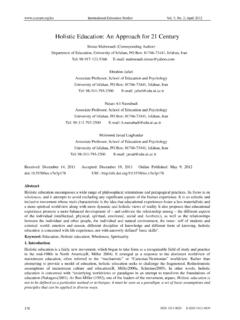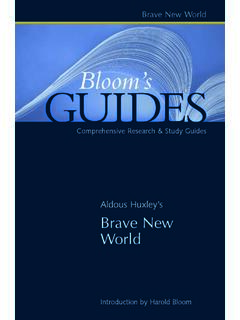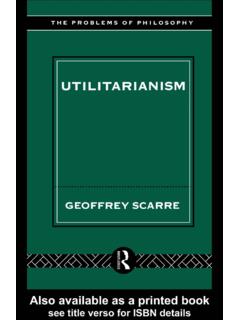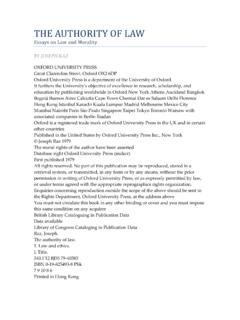Transcription of ESSENTIALISM IN PHILOSOPHY, PSYCHOLOGY, …
1 Journal of Innovation in psychology , Education and Didactics Vol. 22, No. 2 2018 193 - 204 ESSENTIALISM IN philosophy , psychology , EDUCATION, SOCIAL AND SCIENTIFIC SCOPES Mehmet AHIN a* a Ahmet Kele o lu Faculty of Education, Necmettin Erbakan University, Konya, Turkey Abstract ESSENTIALISM is an approach assuming that people and things have natural and essential common characteristics which are inherent, innate and unchanging. Thus, it is regarded as an educational philosophy . However, having the common essence and the same essentials at the same levels can lead to undesired practices in real life too. Even nouns and pronouns used in daily communication reflect some connotations of a philosophy as a system of beliefs about reality based on how we perceive ourselves and others in terms of our existence.
2 How we address ourselves and others also represents our point of view related to the relationship and interaction between us and others. ESSENTIALISM as a philosophy has impact on our differentiation or unification ways while addressing. In this sense, the pronoun we represents a kind of unification while the pronoun you refers to a kind of discrimination or differentiation, which can be referred as a kind of taxonomy used in communication. This paper seeks to present how ESSENTIALISM is used as the basis of our daily communication and its role in our discriminating and unifying efforts in social, cultural and scientific domains. ESSENTIALISM in education asserts that common and essential ideas and skills belonging to a certain culture should be taught to all citizens at the same level at especially primary school level.
3 To do this, the teacher s authority in the classroom is emphasised and the subject matter is the centre of the curriculum. The essence or the centre of education is the core curriculum which is a combination of hard work and rigorous effort. The unification role of ESSENTIALISM is represented in the core curriculum that aims to transfer the essential knowledge and skills needed for the equal and well-balanced citizens. The discrimination function of ESSENTIALISM comes out in politics, natural sciences in the form of taxonomy. Key words: discrimination, ESSENTIALISM , essence, taxonomy, unification * Corresponding Author. Assocciate Professor Mehmet ahin E-mail address: M. ahin/ Journal of Innovation in psychology , Education and Didactics 194 1. Introduction Plato (428 348 BC) was a leading Greek philosopher and the disciple of Socrates, who founded the Academy where Aristotle studied.
4 He studied the philosophy of Parmenides, whose conception of permanent, unchangeable and imperishable substance as the truth. Plato's idealism suggests that all things have an essence, an idea or form. A substance has certain characteristics: durable, separable, and identical but everything explains its being with the help of the discrimination between essence and existence. As essence is the what of a thing, the substance and essence have been among the most fundamental concepts of metaphysics focusing on faith and reason as they are permanent, unchangeable and imperishable. In Christian history, while the Catholics maintained a strong attachment to the past and traditions in terms of classics, the Protestants focused on what was essential for their time and daily life.
5 Thus, for them, the curriculum is supposed to cover the essential subjects like reading, writing, and arithmetic, which leads to the theory of education termed as ESSENTIALISM . ESSENTIALISM in philosophy stresses that people and things have natural characteristics and these characteristics are inherent, innate and unchanging since they compose the essence of that being. In other words, entities or beings have an underlying and unchanging essence and this is necessary to its identity and function, with which it is identified. In education, ESSENTIALISM is an educational philosophy or approach which assumes and proposes that all children should learn the traditional disciplines and basic essential subjects thoroughly and equally. It can be defined as a doctrine that certain traditional concepts, ideals, and skills that are essential to society should be taught thoroughly and methodically to all students, without considering individual conditions, capacity, ability, needs and interests.
6 The primary objective of essentialist education is to transfer the traditional knowledge and cultural heritage of a certain society and civilization to students. A core curriculum serves this when it covers the study subjects on the surrounding environment and basic and unchanging natural laws. The disciplines that encourage a happier and more educated living style are included in the curriculum for this purpose (Howick, 1971, p. 49). Thus, traditional disciplines serve to transfer and transmit cultural heritage to students in a way that the teacher determines. According to Essentialist movement, there is a common core curriculum that is based on the essential knowledge to be transmitted to students in a systematic and disciplined way making use of academic rigor. These common core subjects refer to cultural heritage, which is represented in the great works of great thinkers and writers.
7 The main objective of this transmission is to preserve intellectual and moral values and standards. Schools are the main settings to transfer this M. ahin/ Journal of Innovation in psychology , Education and Didactics 195 heritage with the disciplined efforts of teachers from the main and perennial textbooks and essential or classic works. The cultural heritage is transferred with the help of textbooks because textbooks are essential and timeless sources of knowledge and skills to be transmitted. This transmission can be carried out only by academic rigor, which is to be encouraged by the teacher. This does not mean that ESSENTIALISM as an educational philosophy is completely different from perennialism. In perennial movement, the core curriculum is fixed, which is in opposition to ESSENTIALISM because essentialist educators agree that the core curriculum may change since schooling should be dynamic and practical.
8 Students are members of the society and they should be prepared to become valuable members of society in which they are living. However, hard work is encouraged and respect for authority and discipline is to be instilled in students. These virtues are emphasised in ESSENTIALISM because the progressivist approach did not take them into consideration. Especially, the American educator, author and editor William Chandler Bagley (1874-1946) opposed many of the practices of progressive education in the USA. The pioneers and supporters of ESSENTIALISM as an educational philosophy are William Bagley, James D. Koerner (1959), H. G. Rickover (1959), Paul Copperman (1978) and Theodore Sizer (1985). 2. Psychological ESSENTIALISM and language According to psychological ESSENTIALISM , certain categories have an underlying reality that cannot be observed or detected directly.
9 For example, children are not regarded as concrete thinkers but they have an early tendency or curiosity to search for hidden and invisible features of entities. Gelman (2005) deals with the framework of psychological ESSENTIALISM . It can be observed that preschool children and adults from a variety of cultural contexts expect members of a category to be alike in non-obvious ways and they treat certain categories as having inductive potential, an innate basis, stable category membership, and sharp boundaries. According to Medin and Ortony (1989), ESSENTIALISM functions as placeholder notion. They claim that a person can believe that a category possesses a common essence although he or she knows nothing about what that common essence is. A child, for example, may believe that deep and invisible differences between males and females exist.
10 However, that child has no idea about what those differences are. Thus, the essence placeholder implies that category members are alike in unknown ways. It may be a shared underlying structure or an innate, genetic, or biological basis to category membership. In addition, these categories have sharp, fixed and unchanging boundaries (Gelman, 2003, 2004). Essentialists consider the language that children hear. For them, nouns imply that a category is relatively more stable and consistent over time and contexts than adjectives or verb phrases. M. ahin/ Journal of Innovation in psychology , Education and Didactics 196 According to a study by Gelman & Heyman (1999), 5- and 7-year-old children first learned about a set of individuals with either a noun or a verb phrase. Generic noun phrase is another important linguistic device and the generic noun phrase refers to a category rather than a set of individuals.


















